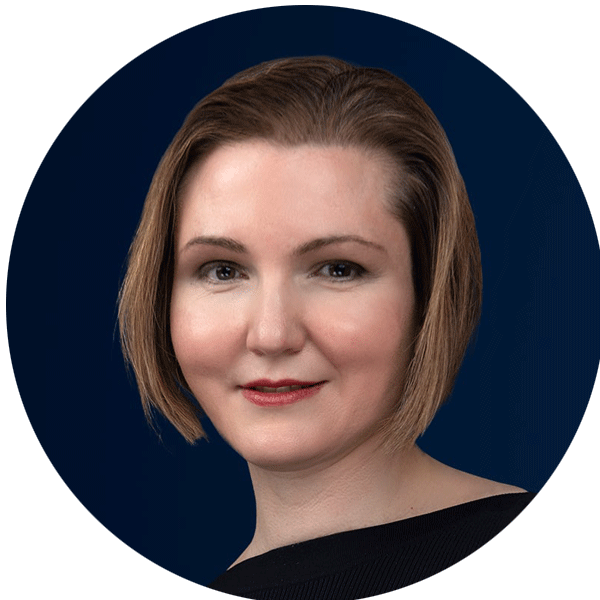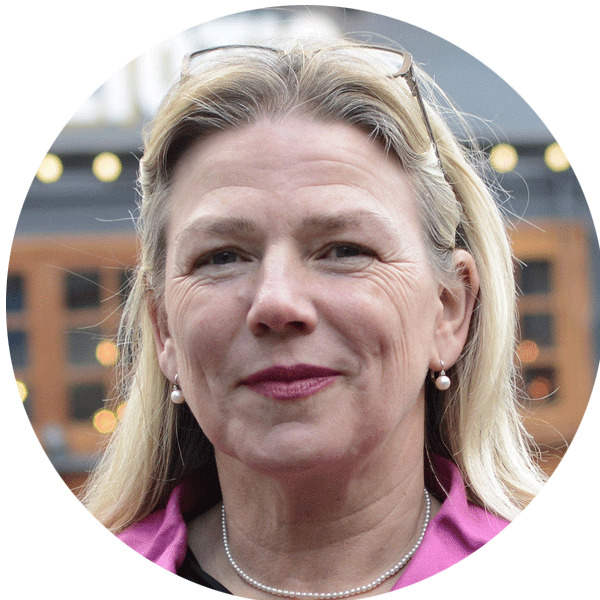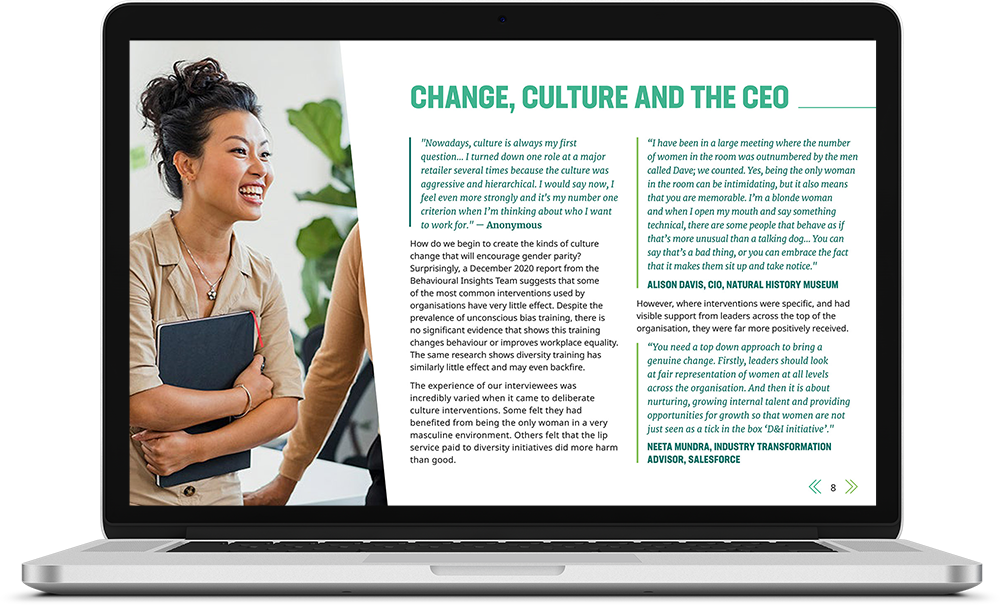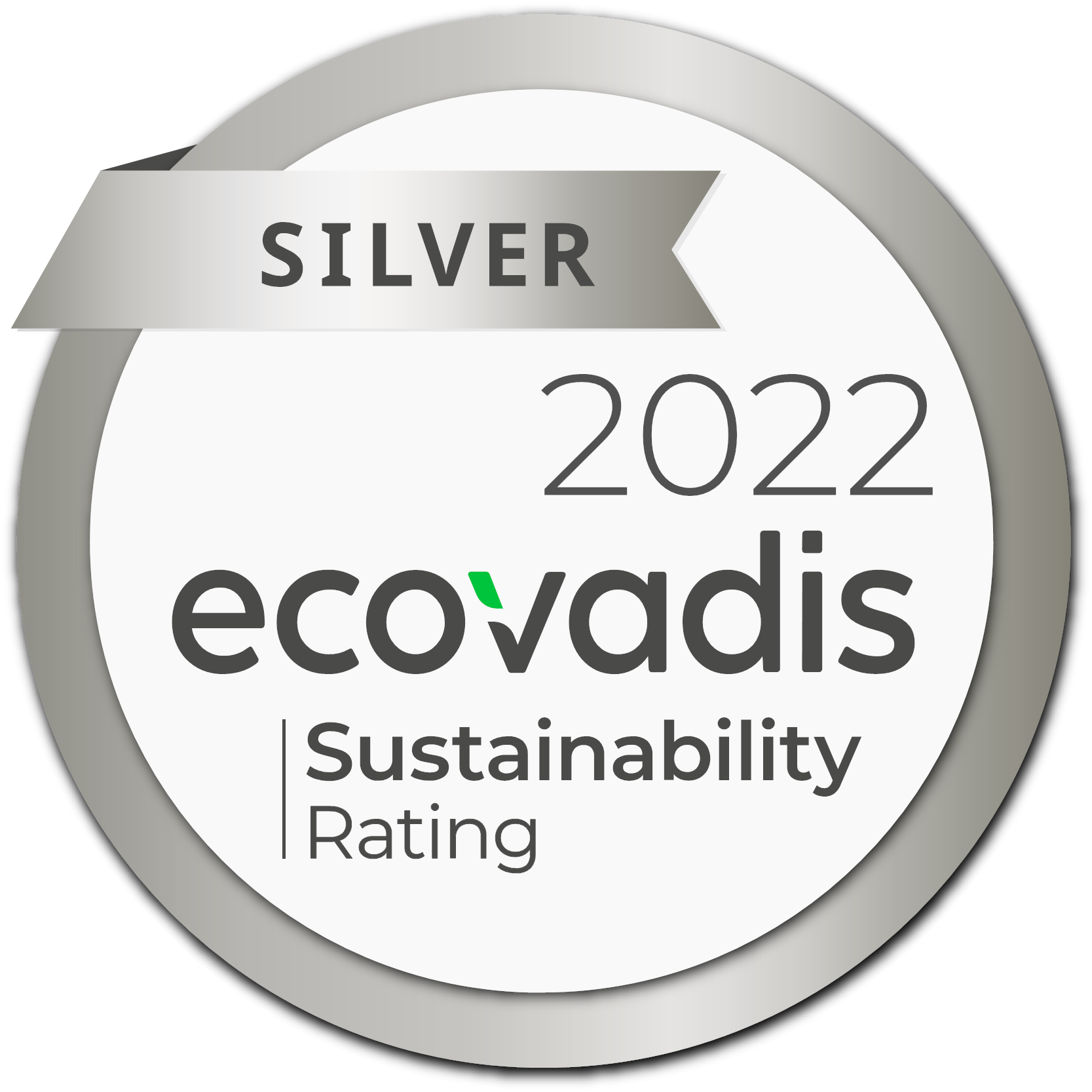Tech’s Leading Women
A video podcast series on lessons in gender, culture, and building an inclusive workplace.

Episode five
Allyship
In an industry where 80% of the professionals are male, we shouldn’t underestimate the importance of allyship and the role men can play in championing women in tech. In this episode, we ask our distinguished panel – what does it mean to be an ally? How can allyship impact attraction and retention strategies? And what role does it play in creating more diverse workplaces?
Kashif: Welcome to Tech’s Leading Women, a video podcast series on lessons in gender, culture, and being in an inclusive workplace. I’m Kashif Naqshbandi, and I’ll be moderating today’s discussion. I’m the Chief Marketing Officer of Tenth Revolution Group, a global firm that specialises in plugging the cloud computing skills gap. This video series was inspired by the whitepaper we recently published, delving into some of the key issues facing women across the tech industry. Today’s panel discussion is focusing on the concept of allyship. In an industry where around 80% of professionals are male, we shouldn’t underestimate the importance of our allyship for women in tech. In fact, most of the women we interviewed for our whitepaper agreed that men had been the most influential figures in their own careers by recognising their abilities and championing them. As one interviewee said, you don’t have to feel guilty about having your seat at the table, but you do have to think about what you’re going to do with that privilege of having the seat. So what can men and women in these privileged positions do to become a true ally and help females stay and progress within our industry?
Today I’m joined by three influential women from the world of tech who’ll be exploring this topic with me in greater detail and sharing their unique perspectives on allyship. So let’s meet them. Sarah Liu, Founder and Managing Director of The Dream Collective. She’s an international speaker, trainer and facilitator on next generation leadership, diversity and inclusion, and sits on the judging panel for Forbes Awards. Next, we have entrepreneur, portfolio non-exec director, author and philanthropist and CEO of Global Transform, Dax Grant. Dax was listed in the global CIO 100, which has helped Foxy 100, Fortune 500 companies catalyse their performance and achieve purpose beyond profit. Annie Gardner UK MD at Global Consulting Firm Slalom completes our lineup. Annie is a business leader with vast experience working in information technology and services industry, and she’s skilled in coaching, business transformation and governance.
Thank you, Sarah, Dax and Annie for joining me today, I can’t wait to get our discussion on allyship underway and hear your thoughts. So let’s get started straight away with our first question. What does it mean to be an ally and what makes a good ally? Dax, if you could share your thoughts please?
Dax: Yeah, sure. I mean, it’s interesting, allyship and being ally is important in so many different ways, not only from a perspective of supporting women, but supporting each other in a diversity and equality and inclusion perspective. An allyship is really about looking out for others and supporting them and looking for opportunities where you can be proactive in helping them move to their ambitions of being aware of other people, their talents and always scanning for opportunities where you can introduce, where you can elevate someone, give them their next chance or help connect people really to create greater good. So allyship is a very selfless characteristic, it requires quite a lot of focus on, you know, recognising talents, recognising opportunities and putting all those things together and being very honest, humble and respectful about all of that in terms of how all those things are connected.
Kashif: Very good, very interesting perspective. Is that something that you’ve sort of seen in your own career?
Dax: Absolutely, I’ve seen it in pockets. I’ve seen it, you know, happen supporting each other, introducing people into opportunities, but also, you know, this works really well in terms of growing potential, recognising people’s strengths and also creates some of the world’s strongest teams, whether they be, you know, a small team of two or three or organisationally in a function as well. So lots of different opportunities that I’ve seen around that. And that varies as I say, some of that may be within an organisation, but also in terms of the networking that we all do, there’s lots of opportunities to create allyship in the marketplace and connect across organisations as well, so I’ve seen both of those. Have I seen enough of it? I would love to see more of it in the world.
Kashif: Excellent, Annie what are your thoughts on what makes a good ally?
Annie: Yeah, so I mean a number of things, and first and foremost, I mean, this is about being a good leader more broadly, but specifically around allyship is around being authentic oneself and being vulnerable oneself because it’s only by doing things like that, that one can create an environment where other people are comfortable being authentic and comfortable being maybe honest and genuine about what they might need or what might they benefit from to enable them to be most successful. Another key thing, I think, in terms of being a good ally is really looking out for the opportunities to amplify others’ voices. So being selfless, being humble, some things Dax was just mentioning, but being there in the background and being ready to make sure that other people can see all the brilliant things that all these individuals bring to bear that they may not obviously notice. And the third one I would say is, you know, speaking out on behalf of people and assuming good intent. So being a good ally is being able to be vocal and create opportunities for other people. And by assuming good intent of others, it’s almost easier to do that.
Kashif: Very good. Sarah, do you have anything you’d like to add?
Sarah: Yeah, I think when we talk about allyship in the diversity, equity and inclusion context, it’s really important for us to differentiate being a sort of passive supporter versus active advocate at a vocal ally. And that’s usually where I think people, probably not a misunderstanding as such, but I think people need to take the concept of allyship so much further. I think a lot of times we do hear people say, oh yeah, you know, I support, you know, diversity and you know, I support it, but how does that support look like in a really vocal and how are you expressing it in a way that comes with accountability? So I would really take the allyship concept further. It’s not out being a passive supporter, it’s actually about being an active and vocal ally when you know, create opportunities and you actually become accountable for their progress. And I think that is when the allyship component and that role becomes really significant.
Kashif: Excellent. I think, you know, you’ve all made some three really, you know, excellent points there all three of you. I think, you know, the point about being very deliberate about it and being very proactive is I think is super important. You know, like you say, if you are just passive around it, you’re not going to move the dial. So I think it is about somebody being deliberate and looking out for those opportunities to bring people up as well. Great, thank you for that. Question number two, what role does allyship play in creating attraction and retention strategies? Sarah, could you give me your opinion on that, please?
Sarah: Yeah, sure. So we actually work at the Dream Collective, we actually work with a lot of technology companies, about 82% of our clients are technology companies who are looking to attract diverse talent, retain them and advance them. And a lot of times they come to us and their problem statement is that we are really struggling to retain talent, so can you please help us attract them? And what we realise after a bit of a discovery process is that they’re actually getting the women in, but they’re not actually keeping them because the internal culture. So what happens is that you end up solving the wrong problem and there’s actually a lot of leakage, you know, later half of that talent acquisition cycle. And so that’s a really interesting one because a lot of times companies think it’s an attraction issue, but really if you were to look at the internal culture, are you building an inclusive culture, are managers being allies, are they having the right type of conversations and creating opportunities in active coaching and sponsoring a high talent and high calibre diverse talent into the next stage of their career? That’s when you actually see retention and true advancement. And that in itself will actually lead to better employee brand and actually increase talent acquisition as a result. So the whole ecosystem needs to be complete and I think that’s why change always needs to start from within, and it’s by actually building a culture for allyship it will actually help with your talent acquisition and talent attraction as well.
Kashif: Makes sense and obviously plays onto the first part about you know, building that culture, and actually being very deliberate and proactive in, you know, building that allyship across all the sort of diverse segments. Annie?
Annie: Yeah, so building on that, Sarah. So I would say spotting talent early, being deliberate about it, helping address, having that kind of authentic and vulnerable conversation where people feel comfortable saying what it is that is needed to help keep them motivated, help keep them within the organisation, help them keep them growing and feeling fulfilled, finding really exciting roles, stretch roles, and encouraging people to actually apply for them because they may not think they’re good enough to apply themselves, but finding them and then supporting them as they start those roles. And then the other thing I’d say is thinking about things like stay interviews, you know, we always do a leave interview, but we often don’t do a stay interview. And wouldn’t it be great to understand why people are saying well, why they might be thinking about not staying and then be able to do something proactively to intervene at a moment where you can.
Kashif: Interesting. Could you just give us an example of this, something, you know, with the positive sort of outcome for one of the stay interviews, that’s a really interesting sort of perspective.
Annie: Yeah, it might be somebody who says, you know, I’m coming back to work after my second maternity leave and I can’t work out how to juggle these things together and actually, I don’t think it’s worth it because the role I’m doing isn’t really fulfilling me. And it might be a case of creating more flexible work options to help them get by, but it might be a case of having an even bigger stretch role that makes them more exciting, more passionate about coming to work when they leave some loved ones behind, that’s one example.
Kashif: Excellent, excellent. Okay, thank you. And also just, you know, in terms of what you said about the stretch role and actually encouraging them to apply and support, I think that’s a really key point as well, so thank you for that. Dax, have you got anything to sort of add from your perspective and your experience?
Dax: Yes, allyship and culture, positive culture are very positively directly correlated. So, you know, taking away the equality to diversity piece or whether it’s, you know, men, women, whether it’s from a different minority group or whatever it may be, if we think about what’s a positive nurturing environment, if we’re all supporting each other and looking out for each other, how fantastic is that? And wouldn’t you want to stay in that sort of environment, wouldn’t you want to grow in that environment? It’s just, you know, the natural thing we as parents, that’s what we encourage in schools when we’re selecting our schools, that’s the environment we want to create, you know, bringing the whole person to the workplace, you know, because you’ve got a few years on school doesn’t mean you’re any different from, you know, that child that wants to be looked after or supported in any environment, there’s a child within each of us. And being able to nurture that child in a really positive way is just so empowering, but it does require a few things. It requires, as I say, being very, very selfless, it requires an abundance mindset. So to really be a growing an allyship-based culture and environment, you have to recognise that whatever you’re doing, everybody’s going to win out because there’s more than enough to go around, there’s more than enough work, there’s more than enough positivity. And the more we grow it, the more fantastic our culture is for the company. So it’s about recognising all those things, but also recognising that in any environment, there are some people that naturally think that way, there are some people that might be frightened by promoting others. So, you know, you have to respect that and understand that and take everybody through that journey. But it’s very, very powerful and it’s something that the top-performing organisations are very, very good at. Is it consistent across the place? I’ve not seen it consistent everywhere in any organisation, nothing’s perfect. But it really does make a huge difference to everybody in the firm and how people feel.
Kashif: Excellent, thank you. Next question, how has the idea of allyship, particularly in the world of tech changed in recent years and how movements such as HeForShe and Black Lives Matter impacted this shift? Dax again, if you don’t mind.
Dax: Yes, I guess what… I see lots of initiatives, right? So you know, HeForShe, you know, whatever group it is, we’ve almost re-compartmentalised everything, so that we’ve created this world where, people do do more of that because of those sorts of initiatives, but wouldn’t it be great if people did that anyway, and not just sort of grew so, you know, it doesn’t have to be for any one group. It really is recognising each other and it’s about seeing each other, respecting each other, and as I say, in that sort of environment, the more everybody can see each other and see each other’s potential and talents, the more everybody feels recognised. It’s just a whole different way of working and you know, me personally, in the industry across lots of different organisations, I’ve seen lots of positive shifts. Is it anywhere near the levels that I would love to see that? No, I think there’s huge amounts of space to do more on that. And I do think some of the measures that we look at in the background reflect that in the industry. So lots of opportunity to do more, but it really does have to come from the heart rather than any sort of top-down initiative.
Kashif: Excellent, thank you. Sarah, please.
Sarah: Yeah, I think it might be relevant to actually share a research that we conducted at the end of last year, amongst 2,000 men across the APAC region. And what we uncovered was that 52% of these white-collar men are now feeling reverse discrimination, quote and quote, and feeling that diversity and inclusion initiatives actually sometimes could put them in a disadvantaged position. And I thought that was really interesting that the research uncovered that, but at the same time in the same research when they were asked, okay, so that’s your perception, but has your opportunity at a workplace actually changed over the past two years, 82% or 83% actually said, no, it hasn’t changed, or in fact it has improved. Indicating that perception, that reality is not the same. So on one hand, they’re feeling that because there’s an increased, I think awareness, education and scrutiny on particularly technology companies to build inclusive culture, to hire diverse talent, I would say the attitude sometimes whilst we see a lot of good progress, we also see some people, particularly from men or the majority are feeling reverse discriminated, you know, rightly or wrongly, that’s the perception that’s actually currently being experiencing but that’s actually not the reality. So I thought that’s probably an interesting piece for us to reflect on in terms of, you know, we see a lot of these initiatives, we think we are moving towards the right trajectory that’s indicating progress, but sometimes we need to go one layer down and look at what are some of the… So beside its artificial harmony and artificial progress, are we actually making true change or people are saying yes to these things because they feel that’s the right thing to do and say, and I think it’s really important for us to bring that extra layer of scrutiny to what we’ve seen in the market.
Kashif: Annie, what is your perspective? What have you seen over, you know, in terms of the allyship in the tech world, in the last few years, how it’s changed?
Annie: Yeah, do I think things have changed enough and quickly enough? No, but I do feel that things like HeForShe and Black Lives Matters have made a difference in terms of a bit of a wake-up call to people that didn’t necessarily think before that they needed to be involved or they were being asked to be involved. It almost gave some people permission to say, how can I help or tell me more or teach me about this. How can I be a better person to support you in whatever your situation might be? So do I think things have gone far enough? No. But I do think they have helped tackle certain sectors in certain groups.
Kashif: Yeah, agreed I think the-
Sarah: And I think the-
Kashif: Go ahead.
Sarah: Oh, I was actually just going to say, I think that really resonated because in the research that we also uncovered that most men, when it comes to gender equality initiatives, they actually feel that they do have a role to play, but they don’t know what role to play or how to be part of it. So I think these initiatives have been helpful, you know, in creating a space for different people and everybody to participate and I think allyship as a concept, as a framework has enabled people in a more privileged position to then think about how they outwork, you know, they’re privileged by supporting and becoming vocal allies of others.
Kashif: I think that’s a great point there, Sarah, you know, people want to do it, but they don’t actually know how to, you know, and what good looks like, good allyship looks like. ‘Cause if you don’t see examples of it, if you don’t discuss it openly, I know that we certainly in our organisation have had a dramatic shift in that and been very clear about what we need to do about it, and you know, set ourselves some quite bold targets to get you know, people into, you know, minorities into leadership positions, which actually leads me into question four, which is, interviewees in our white paper, unanimous in their view – allyship is essential if you want to make real progress in creating a diverse workplace, but how can each of us approach it? So this is the sort of actionable insights from the experts please. Dax again, please.
Dax: I mean, it’s really important to role model. I know we talk about HeForShe and we talk about, you know, one way of allyship, but you know, the best way for allyship is to model it and role model it. And, you know, there isn’t any sort of grand plan around allyship particularly, but it’s about being aware, it’s about being, you know, conscious and attuned to it, you know, and if I spot an opportunity for anybody that I think might be helpful to them in the organisation, or in terms of any development, I’m always looking from that coaching mindset and a coaching mindset is around seeing the potential in everybody, wherever they’re at, when you look at them, all you see is their potential and how to own that potential and then because you are very aware, then be able to spot and be their sort of eyes and ears, and then suggest other things for them. In a you know, have you thought about, or you know, this opportunity come up, you might be great for that, things like that. And they’re really, really simple actions. And as I say, you know, I see a lot of these diversity inclusion initiatives, it’s really important that everybody is in our life for everybody. And really that takes away all the imbalances in society. If we do that consistently enough, everybody will feel included and involved and you know, the segmentation then drop away, we’ve just got fantastic environment, we’ve got people that are motivated positive and only wanting the best for each other, which isn’t that what life’s all about?
Kashif: Absolutely. I think that the point you made there about being aware, conscious and attuned to it is really key, you know, for people that aren’t conscious or attuned to it right now. So I think that’s really helpful, Annie.
Annie: Yeah, thanks. Just building on the role model point and the question around some people don’t know where to start. I mean, ideally if one can be the role model themself, but if you don’t feel that you can be, then find others that you think can be a suitable role model for the person might need some allyship. Go talk to the people in your circle and the people in their circle and find people and do some connection, but be proactive and deliberate about it by helping set someone out or help them move progress along that journey. And then I’d say, listen, know, and listen carefully to each person’s individual situation and circumstance and what might make a difference to them, because what might make a difference to them is likely to not be the same thing as to someone else and speak out. Speak out, assume good intent, but speak out. I mean, we all hear whether it’s unconscious bias, you know, words that we think, you know, aren’t appropriate situations where someone should have been involved in a meeting that wasn’t included or could have been included, assume good intent and speak out and say, why don’t you, why not? And just try and help create that positive, as Dax was saying, that positive kind of environment that people will want to bring others along with them. And don’t give up. Sorry, finally, don’t give up, right ’cause we’ve all been doing this for such a long time. Let’s just keep persevering and not giving up.
Kashif: Absolutely, Sarah – you nodding there in agreement.
Sarah: Yes, yeah I love that actually. ‘Cause sometimes you do feel like giving up a little bit don’t you, especially having worked in this space for so long. But I think when it comes to allyship and really practical three-step, I would call it the AAA, right? So I think the first step is acknowledgement, acknowledgement of the importance of an ally. I think a lot of people think ally is sort of like a peripheral sideline role that you play. It absolutely is not. In fact, if you look at all the significant changes and progress, that’s driven in the world, it’s actually by allies, you know? So I think it’s really important for us to understand, acknowledge every single one of us that we play a significant role. In fact, you know, our research uncovered that, you know, men feel that they are only, they in terms of level of importance, they feel they probably will only make about 22% of the difference. They get involved in diversity and inclusion particular gender equality initiatives. But in reality, what we see is that companies who engage men in gender equality and allyship activities, the activities were 86% more successful. So 22% versus 86% are huge disparity in terms of understanding how important allies are. And then the second thing is about ask. So it’s almost like the, it’s exactly what Annie said about listening, but actually like to make sure you ask. We hear a lot of allies coming to us and you know, I want support, you know, but I don’t know how to just ask, right. So I think, you know, take the active step to actually ask and listen with the intent to actually help, not with the intent to just sort of sit there and not do anything with that information. And then lastly, the third part is actually action and advocacy. So once you have acknowledged your importance and actually accept the responsibility by actually asking people, hey, how can I be part of your solution? Actually, put it into action and advocate for them, put their name in the ring for promotional opportunities, pass the mic on when you get asked for your opinion, the really practical things that you can do, right? But I think, you know, acknowledge, ask and you know advocacy through action are really important terms, helps simplify what allyship can be and how to activate that.
Kashif: Excellent, the three A’s – I’ll remember that. Just one question, actually, you know, you mentioned the importance of the acknowledgement piece and the sort of perceived success rates or 22% versus 86%. What was the measure of that success?
Sarah: So measure success is level of impact and results achieved. So level of impact, meaning how fast and how much do they actually deliver on their internal metrics and also measure of progress. So out of, you know, 10 sort of initiatives or measure success, which one did I actually achieve? So it measured both speed of change and also scale. So actually delivery of some of the targets and initiatives.
Kashif: Great. And just, and I’ll go to Annie actually on this one. What you know, in terms of the ask piece of the three A’s, how often have you seen people stick their hands up and say how can I help and how do we sort of try and tease that out of everybody to make it, you know?
Annie: Yeah, so as in most of my career you know, been one of the few women in one of the more senior situations, you often get quite a lot of asks, a lot of people will come and say, what can I do? How can I help? And you know, the first part always is be authentic yourself, be vulnerable yourself and kind of go learn and immerse yourself in the people around you and what they’re feeling and experiencing. In the case of, you know, gender, you know, maybe go and talk to some of the more junior women around you, maybe go talk to your daughters or your daughter’s friends, or your wife or your sister go and seek and find out some of the things that people are experiencing and kind of absorb and take it on board and then come back and be vulnerable and share. Because what I found over my time, you know, which is quite a long time, but it is more recently that people are comfortable sharing things that make them vulnerable and talking about things maybe in their private life, their personal life that make them up. So yeah, so I’ve seen it quite a lot and my thing is go seek, find out, but be authentic and vulnerable.
Kashif: Excellent, thank you. Dax anything to add to the three A’s or Annie’s comments, please?
Dax: I love Annie’s comments, I love the three A’s – I’m going to keep that one. Anything to add, I’m not sure it’s rocket science, let’s just all go and talk to each other and find out how everybody is and simple ways to help each other. And sometimes people don’t need lots of help, sometimes they, you know, they just want you to hear them and listen and create that supportive environment. But you know, if you’re in a team, a firm, an industry where everybody’s doing that, you know, the world is just such a lovely place and the more we can spot that for each other and the more we can spot when someone’s down or when someone’s rocketing and we can help them, you know, all of those things matter. And the other thing I would say is, in terms of allyship and thinking about that from a whole-person perspective is, you know, let’s be aware of each other as individuals and people, but you know, every person that we meet has a family and friend set in some shape or form. So whatever we do for that person, not only have we positively impacted that person, but they will take that back into their environment and they will spread that positivity into their own groups. So those very, very small actions may seem insignificant, they’re actually the most powerful things on the planet. So little things count.
Kashif: Absolutely, thank you. Okay, question five, thinking about the connection between allyship and, for example, race, disabilities and neurodiversity, should we do more to embrace this and how can we achieve this in practise? Feels like question one is, you know, we already know the answer, right. And again, I think I’ll go back to you Dax if you don’t mind.
Dax: Yeah, absolutely-
Kashif: More about the achievement in practise, which we’ve sort of touched on, on all the other questions. Sorry, go ahead.
Dax: I would say more yes, but it’s not necessarily about more it’s about being present in the moment, if we’re all present for each other… Don’t get me wrong, I’m the hugest technologist at heart as well, but technology is as good as our behaviours is my belief. So you know, today we’re able to talk through technology, but it could be, being present for people around us, putting away the phone when we need to, all of those things really do make a difference and that presence for each other means that we’re capturing each other in the moment we’re taking a, you know, a photograph in our minds of what we remember and life is very different and that in itself creates an environment and safety harness for each other. So everybody feels heard, everybody feels listened to, everybody feels they’ve got people around, they could turn to at time and just go, I’ve got this thought, what do you think? Or, you know, I’m exploring this in terms of personal development, you know, got any views on that? It is those really, really simple actions. And if you think about how many people are in this world and on this planet, if everybody took one of those actions every day for each other, wow.
Kashif: Absolutely, thank you. I think again, really good point there, which was having somebody around to listen to, you know, that’s really resonated for me. So thank you. Sarah?
Sarah: I think, especially when it comes to neurodiversity, you know, and disabilities, we really need to look at our system and the structure in which we’re created. I think, you know, we need to be very mindful of the biases that’s actually being built into our system. So for example, interviews right? So our interview process for any company and the fact that you need to do some, you know, face-to-face interviews actually makes it incredibly hard for people who are talented, but maybe on the spectrum to actually engage and I suppose, deliver a level of results that we comprehend as good and strong performance, right? So I think I would really challenge all of us to thinking about within the structure that we find ourselves in, where can we make a difference? Where can we change and evolve it to actually make it more inclusive? And once again, that’s a role than our right understanding there are limitations and biases in our system and actually take an active step to evolve that, to become more inclusive.
Kashif: Great, and just in terms of practical advice, you mentioned the spectrum. How would you sort of execute that?
Sarah: Great question. So an example is Microsoft – their diverse hiring programme. So they actually created a programme where they wanted to open up to hire talent from the autism spectrum. And so what they did in that process is that instead of following the traditional CV, phone interview, in-person interview, et cetera, the candidate can actually opt into interview through email. So they actually, instead of phones, right, instead of face to face, actually emails, or they provide them with whiteboard and they can be on their own after they’ve solve the situational questions, they come back and actually talk it through with tools and whiteboard rather than trying to articulate it verbally. And so that really practical two examples where you know, it’s quite widely published around what that diverse hiring programme looks like. And so I think once again, looking at the system, the structures, the tools we offer to people, how is that inclusive? Are we making assumptions around what we work and these two areas are straight away things that we can make adjustments to quite easily.
Kashif: Thank you, great example. Annie, what are your thoughts on how we can sort of put this into practise?
Annie: So I’m absolutely passionate about strengths and having a strength-based mindset and culture. I’m actually as a hobby, I’m a strength-based coach. And I actually think if we can get everybody, as individuals, to think about their own authenticity, their own unique strengths and maximise those, and use those when working with others and working in teams and if people were to talk about strengths, we automatically get to a conversation where we are thinking about people as individuals and their individual makeup. And it kind of takes us a little bit away from some of the labels that we might have. And I find that a great way to take the conversation to a different place.
Dax: If I could maybe build on that a little bit as well. I love your comments there Annie around the strengths on the huge proponent of the strengths finder model and it really does, you know, also build on some of the things that you said. Sarah around you, you know, we place all these labels in terms of different groups for different reasons. And that’s the way that society manages different mindsets. But actually what we’re really saying, there is everybody thinks differently, right? Everybody thinks in a different way. And some of the thought processes that we see in some of the minority groups and, you know, in some of the thought process that we label are actually some of the most forward thinking mindsets. It’s just as society, we haven’t recognised the ability to put that in its place and recognise different tool sets around that that is definitely coming next because learning from those different ways of being in the world and those thought process are really, really powerful. And I do believe in society, there will be a further shift in the next five to 10 years, I would say, but even in the next, you know, few years, I would expect those shift is that awareness in society shifts and you know, putting all these things together. You know, I firmly believe it’s about each of us being the best version of ourselves for each other and enabling the best version of everybody else for everybody else. And if we can adopt that mindset day to day, wow. You know, what we did for the planet and you know, we hear all these things about ESG and all the different things in terms of diversity and all those different societal causes a mindset like that in society that, you know, spreads that is going to be one of the most powerful things on the planet.
Kashif: Excellent, thank you. Final question, reflecting on everything we’ve discussed today is allyship the key to retaining women in tech? Annie please–
Sarah: I might take that then I think.
Kashif: Okay, go for it Sarah.
Sarah: Oh, sorry what was that?
Kashif: That’s okay, nothing, go ahead, please.
Sarah: Oh, okay. Sorry, I think there might be a bit of lag. Yeah so I think it’s definitely one of the most important thing to attract, retain and advance women in technology. I think we cannot underestimate the role that ally plays, especially when tech currently broadly speaking are still quite male-dominated. So the fact that the more allies that we have, the bigger change a tectonic shift can happen. So I think having building more allies, empowering more allies, but once again, but also equipping what allyship looks like and putting actual structure around it. So for example, as opposed to sort of mentoring programmes, actually look at how you can introduce sponsorship programmes, you know, because overall, you know, women tend to be over mentored and under sponsored, you know, so how do we actually give allies practical tools and structures to really advocate for gender equality and also the different intersectionality that comes within it as well, different type of diversity. So yeah, so my answer is absolutely. I think, you know, allies will continue to play a significant role in championing more women in technology.
Kashif: Thanks, Sarah, Annie please.
Annie: Yeah, so I think it’s a yes and I think yes, allyship is very important. I think that’s something we still need to tackle, which is a bit more systemic, which is around doing more in the schools, in the playgrounds and in the families, because you still see, you know, even to gender and tech specifically.
Kashif: Yep.
Annie: You still see a lot of people being put off, just you know, a kind of like unconscious discouragement, not sure that’s a proper word, right. But you know, a lot of that happens very, very early on, so I think we need to see something with that. I also think we need to make sure we have some super exciting stretching roles with support and deliberately encourage and support people to be successful in those roles. So I think it’s an and.
Kashif: Yeah, of course thank you. And Dax, please.
Dax: All of those fantastic points, definitely allyship is a very important part of the positive culture, who wouldn’t want to be in a positive culture. I do believe one of the things that I’m looking forward to these coming out, actually now we talk about this, that everybody will suddenly generate them, but I do believe that we should create more awards and recognition for super allies. So wouldn’t it be great if we did more of that and when somebody does a good job at that, actually that’s what we recognise. And I do believe that coupled with positive allyship anyway, will also shift the balance because what it’s doing by creating that, whether it be a global award or a local recognition, it’s recognises a positive behaviour. And going back to Annie’s point, whatever age you’re at, we’re both, you know, we could be a mother, sister, son, and daughter, you know, friend, we play all of these roles, but the more we positively reinforce positive behaviours, the more that culture shifts and that’s fantastic.
Kashif: Yeah, love the idea of the awards, by the way. I think that’s, you know, really, really cool and you know, we should definitely do that. Well, that brings it to the end of the conversation, which I personally have really enjoyed. That’s some really, really great points, and I’ve learned quite a bit as well. Got me motivated, I can see Josh nodding there in the background as well. Just before we go, a quick wrap up, you know, there’s loads of things that people could do in their own organisation. Could you give me one or two of your sort of key points that are actionable for people watching this videocast, please and Annie please again, could you?
Annie: I was going to steal one of Sarah’s and one of Dax’s, if that’s okay. Sarah, you said, pass the mic, you know, if you want a simple tagline to, you know, to go back to your ask, you know, someone asked me, I’m going to say, pass the mic. And one of Dax’s, which is, if everybody just started with one little action, positive action, wouldn’t that make a big difference? I had goosebumps when you said that Dax.
Kashif: Excellent, superb. Dax please.
Dax: Oh, what else is there to say? I mean, it’s the small things, as I say, spotting, being present in our environment and knowing each other, getting to know each other, and spotting the opportunity, and the potential of the person and saying, you know, have you thought about, you know, to somebody that maybe hasn’t thought about going into the next opportunity or something like that, or volunteering for something or getting involved, have you thought about, wouldn’t it be lovely if you joined this initiative, what do you think it would really add to your talents that you’ve got already, but you would contribute a lot to that group, having those sorts of conversations. Again, very simple, you don’t have to have lots of them, but a few key pivotal ones like that, will just catalyse the whole thing.
Kashif: Absolutely, thank you. That sort of, you know, aligns with what Annie was saying about the stretch roles and actually, you know, making sure you support people with it. Maybe a lot of those people would never have thought of even doing it, you know, or the being brave enough to do it. So having that support as well is really important. Sarah, please, just to finish off.
Sarah: Sure. My challenge for everyone is to actually have coffee with someone, either weekly or monthly, who’s very, very different to you and who you might even disagree with. I think when it comes to allyship, the first step is actually empathy and understanding. So if we were to ask ourselves, when was the last time we hung out with someone who was so different than us, right. I think it’s actually the answers usually, oh, I can’t remember because we don’t intentionally do so. And when we don’t intentionally do that organically, we have this, you know, affinity bias that we just continue to hang out in the circle that’s really, you know, very much similar to us. So my challenge is to actually spend time with people who are very, very, very different to you who might even disagree with you on some things and actually learn to empathise, understand and that’s the first step to building effective allyship.
Kashif: Sounds good, that’s great. And I like the word intention as well that’s you know, really important to be aware of the power of allyship, you know, and you know, make sure you’re proactive about it. So thank you everybody, it’s been, as I say, really, really great and insightful conversation, and I’m really looking forward, to getting this videocast released in the next few weeks. Thanks again and we look forward to catching up again soon.
If you’re watching this and have any further questions that you’d like to put to myself or the panel, please do reach out to us by visiting frankgroup.com or through our Frank Recruitment Group social media channels. We do encourage you to like, and share this episode and keep an eye out for the rest of the videos in the series where we’ll be delving into further topics around gender, culture and building an inclusive workplace. Thank you again.
Meet our panel
Moderator

Guests


Dax Grant is an industry authority and keynote speaker on C-suite leadership within international and global organizations. Alongside her role as CEO of Global Transform, she is an invitation-only member of the Forbes Technology Council and has also been listed in the Global CIO 100.

Annie Gardner is the Managing Director of UK consulting firm, Slalom. She is an established business leader with vast experience working in the information technology and services industry and is skilled in the specialisms of coaching, business transformation, and governance.
About Tech’s Leading Women
Tech’s Leading Women is a vodcast series inspired by a recent whitepaper published by Frank Recruitment Group, spotlighting some of the key issues facing women in the tech industry today.
In each episode, we explore a different topic in more depth, with unique insights and opinions from inspirational thought leaders across the tech world.



